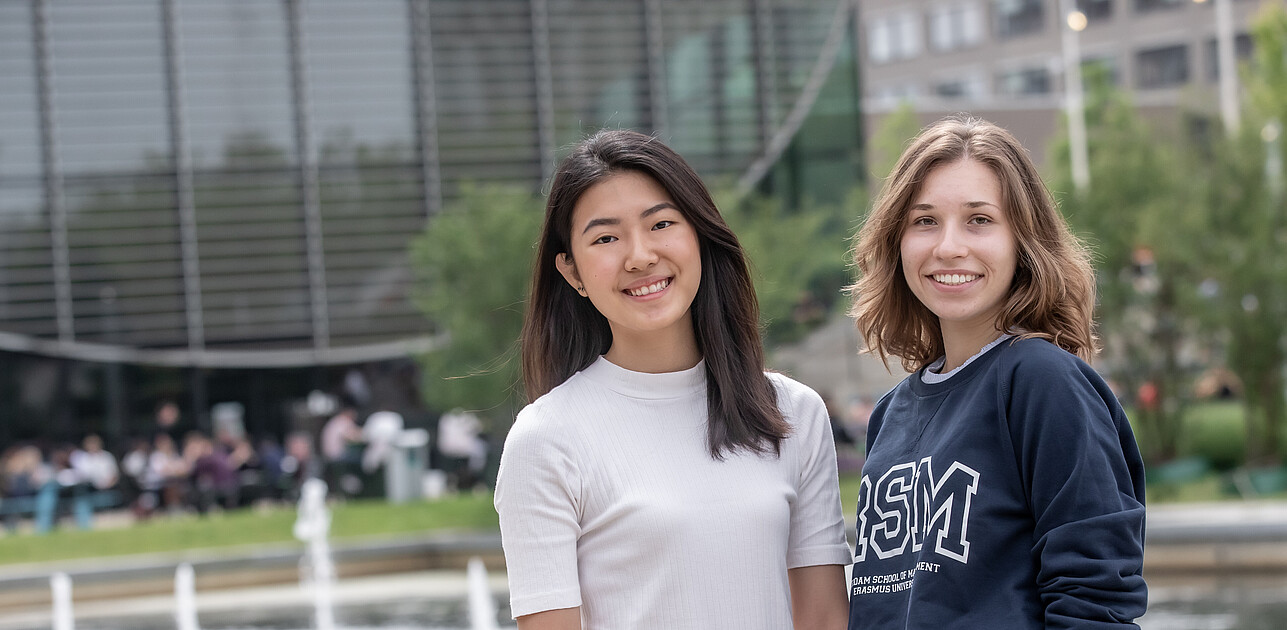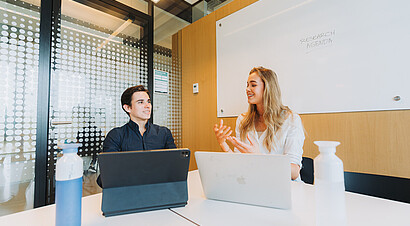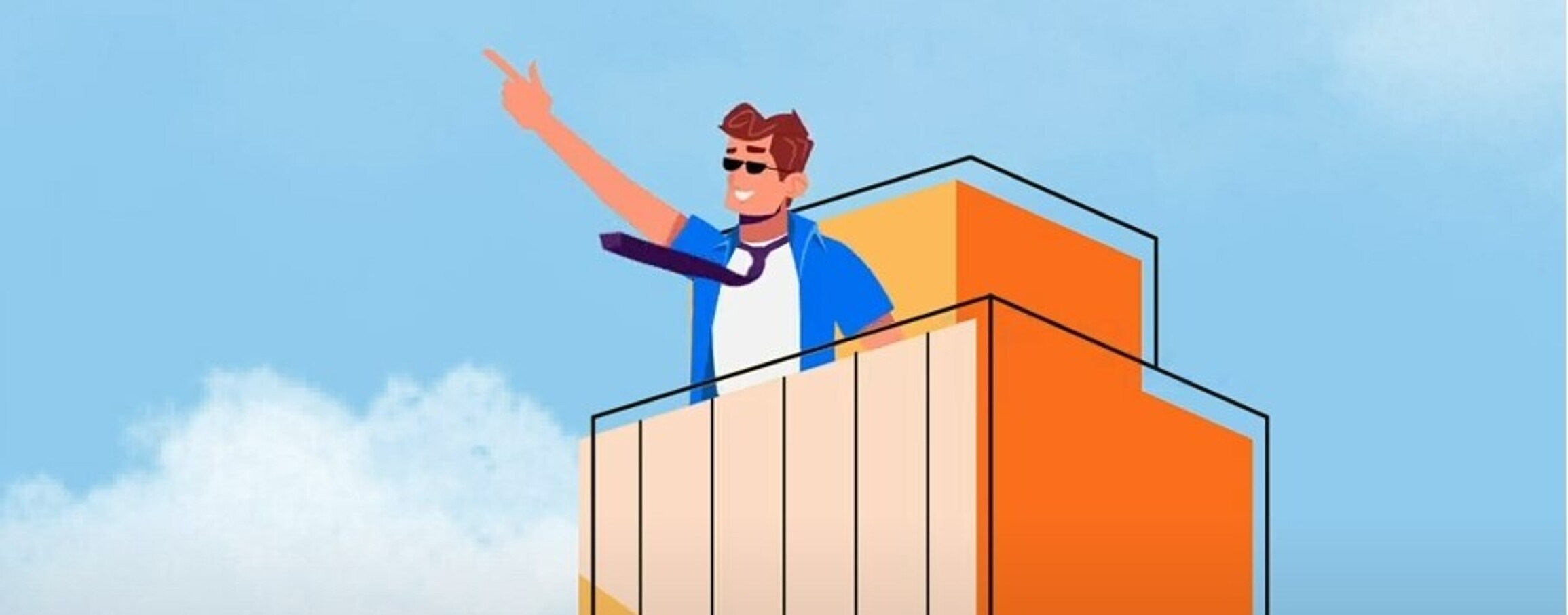Your first two years, you have a fixed curriculum to ensure you have a solid foundation in the functional areas of business.
The third year is flexible, offering the possibility of an international exchange, internship or a minor elective during the first half of the third year. In the second half of the third year, you can pick one of six elective-study tracks. The third year is also when you write your bachelor thesis.
An academic year typically runs from early September to approximately mid-June. Every year you enrol in 4-6 blocks where you focus on different academic topics for a period of 5-8 weeks. For each block various assignments and exams are due.
Weekly schedule:
- A weekly schedule that typically includes attending 2-3 lectures (typically large lectures with all 600+ people in the cohort) per week, as well as participating in 1-2 workshops (typically smaller groups of approxmiately 20 people led by a teaching assistant).
- Dedicated self-study time is crucial, and the amount of time required varies based on the number of subjects you take on and the specific demands of each course. There is a lot of academic literature that you will have to read in your own time to prepare for your classes.
- On average, you allocate 2-6 hours per day for study. It’s important to note that this range may fluctuate depending on the complexity and workload of your individual courses.
Types of assignments:
- Throughout the programme, you encounter various types of assignments that encompass different formats and tasks:
- Group assignments where you collaborate with your peers to tackle a shared project.
- Essay assignments that require you to demonstrate your analytical and writing skills.
- Exercises and case studies are also essential parts of the curriculum, offering practical applications of the concepts you have learned.
Exams:
Exams are both in written form and computer-based, which are usually conducted on campus. These exams may consist of a combination of multiple-choice questions and open questions. Additionally, you might be assigned a final essay that assesses your comprehensive understanding of the course material.
Our education system places a significant emphasis on active student participation in the learning process, which empowers you to take charge of your own education.
In many courses, we implement a hybrid format to combine different modes of learning. Lectures can be conducted in-person, through pre-recorded videos, or via online platforms like Zoom. Recorded videos and online lectures have a student-centred approach. This requires students to independently engage with the content and manage their learning schedule according to their own pace and preferences.
For most courses, students can attend both plenary lectures and workshops. Most in-person lectures are teacher-centred. The teacher explains the content and you can ask questions. Additionally, there are guest lectures given by industry professionals who provide real-world insights and experiences.
Workshops take place amongst smaller groups of students and are led by teaching assistants. This facilitates lively interaction, more opportunities to ask detailed questions and tailored feedback.
If it’s not your native language, studying in English might seem intimidating at first. But rest assured, there is no need to worry. Your proficiency in English naturally improves at a rapid pace as you engage in the academic environment. Moreover, if you meet the English language requirements for the programme, you should have the competencies needed to excel.
However, if your goal is to fully integrate into Dutch society or to pursue employment opportunities in the Netherlands, we highly recommended that you learn the Dutch language. To discover more about learning Dutch, check out the Language and Training Centre here (links to LTC page).
The wellbeing and safety of our students is very important for Erasmus University Rotterdam, and therefore we have multiple initiatives to support personal development, provide mental health resources and enhance overall student experience.
Student advisor team
RSM has a dedicated student adviser team which serves as a point of contact where you can access professional help, advice and guidance during your studies.
EUR student wellbeing platform
From workshops, events, and courses to empathetic ears and personalised help, the platform helps students fully develop their talents and focus on personal growth.
Safe@EUR
Safe@EUR is the central contact point at EUR, offering support for issues such as bullying, intimidation, and harassment through specially trained case managers.
In your first and second year of the IBA study, you have a fixed curriculum which includes quite a few of quantitative courses.
During the first year, we introduce you to international business through a combination of theoretical- and skills-related courses that are the foundation for a career in management.
The second year expands your knowledge and helps you to develop your research skills.
The first year of the IBA bachelor programme consists of four blocks and provides you with an overview of the main processes in most companies: production, marketing, organisation, finance and information management. You learn about all the relevant dimensions of business administration and management.
Course spotlight – strategic business plan (SBP)
SBP provides you with an opportunity to connect with real-life businesses. Over the course of three blocks in the first year, you collaborate closely with your chosen company by conducting multiple company visits and looking into their market and environment data. Finally, you hand in a well-researched and practically relevant report that contains strategic advice to both the company and the university.
For a detailed description of all of the courses, please view the course catalogue (for reference only, catalogue continually updated throughout the year).
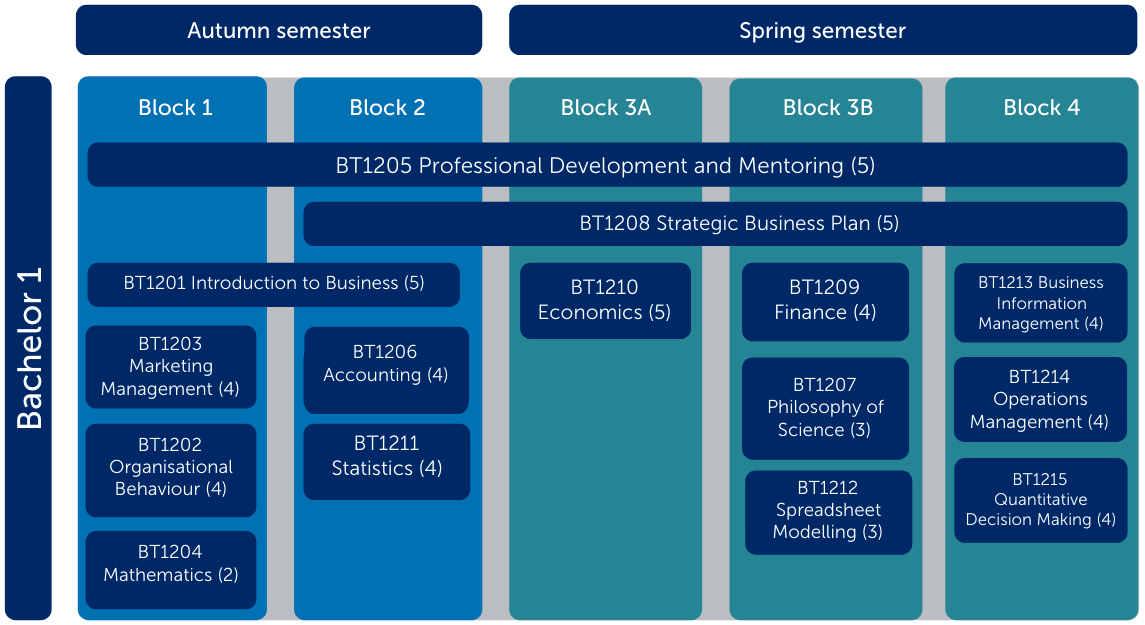
In this course, offered throughout the first and second year, you gain valuable insights into the world of business. You also develop essential skills for career success and receive personalised guidance from experienced mentors.
Mentors are upper-level students who are well-trained and who have undergone a rigorous selections process. As current successful students themselves, the mentors provide important guidance to first-year students who are transitioning from secondary education into university life.
The binding study advice (BSA) in Dutch higher education states that there should be a minimum number of credits students must secure in order to move on to the second year. For the IBA study, you need to pass all your first-year courses (60 EC) to continue to the second year.
Over 85% of IBA students move on to their second year. As long as you stay motivated, work hard and utilise the available support, you should have no problem meeting this requirement.
The second year of the IBA programme also consists of four blocks, but courses such as the research project or entrepreneurship stretch over a longer period of time. A wide array of topics are covered with courses focusing on everything from business law and innovation management to responsible business leadership.
Course spotlight – technology management
The IBA programme has formed a partnership with the neighbouring Technical University Delft (TU Delft), which is a science, engineering and design university. In the technology management course, you and your RSM group work with a group of students from TU Delft on an assignment which requires both groups to understand each other’s worlds of business and industry. This part of the programme encourages mutual understanding of business and industry, an essential skill for any manager.
For a detailed description of all of the courses please view the course catalogue (for reference only, catalogue continually updated throughout the year).

You can elevate your academic experience with the RSM BSc honours programme (extra curricular credits). Designed for exceptional students, this programme offers a challenging and enriching curriculum that goes beyond the standard requirements. You can engage in advanced coursework, interactive seminars and exclusive events, all tailored to foster critical thinking, leadership skills and a global perspective.
As part of the honours programme, you have the opportunity to go on multiple study trips. On these trips you engage with industry leaders, witness ground-breaking technologies and gain invaluable insights into entrepreneurship and business innovation.
If you want to expand your intellectual horizons further, you can gain a unique perspective with the double degree programme in Philosophy and IBA.
With a double degree in philosophy, you can merge the analytical prowess of business studies with the critical thinking and inquiry of philosophy. In this programme, you develop a unique skill set that prepares you for diverse career opportunities in today's dynamic global landscape.
The third year of the IBA programme offers you a range of options to explore your specific interests in a variety of ways.
During the first half of the third year, you can choose one of the following options and, if need be, combine these with various electives to receive 30 European Credits (EC) by 1 February:
- An international exchange at one of RSM’s many prestigious partner schools around the world for minimum 20 EC and maximum 30 EC.
- An international internship, for 14 weeks and 20 EC. RSM’s dedicated Career Centre can help you find an internship.
- An academic minor to broaden and deepen your knowledge for 15 EC, or for 30 EC if you choose the one that is jointly offered with Leiden and Delft University.
- One of the interesting projects organized by STAR, I DO or TU Delft. You will be able to acquire 15 EC upon successfully completing one of these projects.
During the second half of the third year, in addition to the compulsory advanced research methods and the digital business courses, you can choose from six different tracks consisting of three modules. This allows you to follow your interests and deepen your knowledge in one area of business:
- Analytical decision makers (data, operations)
- Behavioural experts (marketing, diversity, behaviour)
- Business developers (entrepreneurship, innovation)
- Financial strategist (finance, accounting)
- Global thinkers (international business, strategy)
- Performance analysts (finance, accounting)
Throughout the third year, you work towards your bachelor project, which falls within your chosen track in the second half.
For a detailed description of all of the courses, please view the course catalogue (for reference only, catalogue continually updated throughout the year).

Your IBA programme concludes with your bachelor project. For this, your knowledge from the advanced research methods course is crucial as it provides you with the research methodology knowledge and training necessary for the bachelor project. The bachelor project is used to measure your ability to present research and opinions – about management of businesses and organisations – in a well-structured, coherent and academic document.
Together in a group of four students, you write your bachelor project, which is based on a theme offered by one of RSM’s departments. You’re closely supervised by an experienced member of academic staff.
Below we have compiled some helpful information about the various types of business administration programmes in the Netherlands to help you determine if an IBA study at RSM is the right fit for you.
The main difference between the various (international) business administration programmes is whether they are taught at a research university (RU) or at a university of applied science (UAS). These two types of institutions make up the binary higher education system in The Netherlands which is comparable to the German, Belgian, and Austrian systems.
At a research university (such as RSM) the education is oriented towards academic higher education, which typically means that the programmes have a more theoretical and research-oriented approach to education. While there is usually also a practical and hands-on component, is this less emphasised and instead theory and concepts are prioritised to cultivate critical thinking with the aim of acquiring knowledge.
Bachelor programmes at RUs are usually three years. After that, most students decide to further specialise with a one-year master degree. RUs also require a final research thesis. Traditionally, internships have not always been part of the curriculum, although this has changed recently. And internships are typically for shorter amounts of time such as 3-6 months.
Studying at a RU might be the right fit for you if you want to focus on the following aspects:
- The role and importance of theory within application.
- Analytical knowledge for professional practice.
- Asking the ‘why’ questions (e.g., why business is conducted in a particular way, etc.)
- Independent learning, which means students excel at RUs when they are successfully able to manage self-study time.
At a university of applied science, the education is oriented towards professional higher education, which typically means that the programmes have a more applied-oriented approach to education. While theories and concepts are also discussed, the practical application of theories is emphasised more with the aim of acquiring specific competences.
Bachelor programmes at UASs are usually four years long, since they typically include a one-year mandatory internship.
Studying at a UAS might be the right fit for you if you want to focus on the following aspects:
- The practical relevance of theories and concepts.
- Applied research for professional practice.
- Asking the ‘how’ questions (e.g., how does a business grow, etc.)
- Hands-on mentality, which means students excel at UASs when they learn best by doing and working in groups.
For students interested in the UAS model, below are some of RSM’s UAS partner schools that have business and business-related programmes:
Avans has an International Business programme as well, if you want to cover all aspects of business in a UAS environment. If you already know that you want to specialse in finance during your bachelors, they also have a finance & control programme.
At BUas, you can explore business-related programmes such as:
- International facility management
- Leisure and events management
- Logistics management
- Creative business
If you are interested in the hospitality management side of business, Hotelschool The Hague has a full-package programme.
RBS has an International Business programme for you when you want to cover all aspects of business in a UAS environment.
University Colleges in the Netherlands offer Liberal Arts and Sciences (LAS) education. LAS aims to impart broad knowledge and further the development of general intellectual capacities and academic skills. Simultaneously, it allows for the opportunity to specialise in one particular field of study, termed a major, with the possibility of supporting that with another field, termed a minor. LAS programmes tend to have small class sizes to foster a tight-knit community, and they have more interaction between lectures, tutors and students.
If you want to combine business with other subjects, an LAS education could be a good fit. Erasmus University Rotterdam has its own university college (Erasmus University College) with business majors and minors that you can combine with other topics.
During our studies, we obtained an immense amount of business knowledge that is transferable to work but I think the degree itself is a result of diligence, open-mindedness, being collaborative and supportive. Your degree might help get the job you want but the traits we all developed during our studies are what enable us to succeed.
Leo Machana - BSc IBA Alumnus, Class of 2018
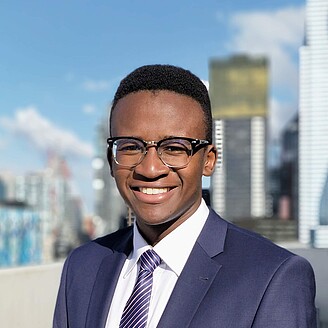
Your bachelor studies at RSM will add to your knowledge in subjects like data science, marketing, consulting or finance, and you will gain new skills in collaborating, presenting and critical thinking.
This will open doors to a wide range of career paths. Below you can find out more about some of the most common steps RSM bachelor alumni take.
Over half of our IBA graduates choose to continue their studies at RSM directly after graduation by joining one of our 12–18-month specialised master programmes:
- MScBA Accounting & Financial Management
- MScBA Business Analytics & Management
- MSc Business Information Management
- MSc Finance & Investments
- MSc Global Business & Sustainability
- MSc People, Organisations & Change
- MSc International Management / CEMS
- MSc Management of Innovation
- MSc Marketing Management
- MScMI Medical Business & Innovation
- MSc Strategic Entrepreneurship
- MSc Strategic Management
- MSc Supply Chain Management
If our IBA graduates do not pursure a masters degree at RSM, they often pursue one at other prestigious universites such as:
- Bocconi University
- Esade Ramon Llull University
- ESSEC Business School
- Imperial College London
- London School of Economics (LSE)
Among others.
International experience embedded within the IBA programme gives you a competitive advantage when it comes to taking the first step in your career. Many of our graduates find positions in multinational firms soon after graduation. Some find a position even before they graduate, thanks to relationships developed during their international internships and other networking experiences throughout their time at RSM.
One way to obtain such experiences is through RSM's dedicated Career Centre that helps current students with:
- Looking for internships, full or part-time jobs in the Career Portal
- Thinking about their ideal career and finding their motivation and strenghts in the ‘Your Future Career’ online study module
- Workshops to develop your CV writing, application writing, and interviewing skills
- Recruitment and career events attended by recruiters from international companies, speed interviews, and career workshops
- Strengthening their career path with mentoring from our 50,000-strong alumni network in the MentorMe platform
- Note that non-EEA students with a Dutch higher education diploma are eligible for a one-year orientation visa called a zoekjaar to help you find a job after you graduate.
Over 90% of graduates are employed within 6 months after graduation. The image below give a broad idea of the different sectors RSM alumni tend to end up after their studies:

A quarter of IBA graduates take a gap year after their studies to travel or to gain more experience through internships, exchanges, board years, or other personal projects.
Tuition fee
The 2025/2026 tuition fee for the BSc in International Business Administration programme is approximately € 12,700. The Dutch government contributes towards this cost for students who hold nationality from a country belonging to the European Economic Area (EEA). These students therefore pay only the statutory fee of € 2,601 per year for 2025/2026.
NOTE: These tuition fees are subject to change. Prior to the start of the academic year, tuition fees may be modified by the Dutch government. Erasmus University Rotterdam reserves the right to make changes affecting policies, fees, curricula, or any other matter announced in this publication without further notice.
Scholarships
The number of scholarships is limited and mainly merit based. If a scholarship covers only the tuition fees, be aware that you need to finance your own living expenses (rent, food and insurances) for the duration of your studies.
Rotterdam School of Management, Erasmus University (RSM) offers scholarships to prospective students from non-EEA countries who are not entitled to pay the EEA tuition fee, provided their grades are considered ‘excellent’.
Besides scholarships awarded by RSM, there are also scholarships awarded by the Dutch government or other organisations that are available if you meet certain criteria such as nationality, age, etc We have listed one of them below but we encourage you to use resources such as Grantfinder or the Scholarship Portal to find additional scholarships.
Scholarship tips
- Contact the Ministry for Higher Education in your home country to see whether there are scholarship options.
For students from the Netherlands or the EU/EEA, it may be possible to apply for limited funding towards payment of your tuition fees. Find out whether you meet the nationality and age requirements and read more information about the application process here.
Living costs
You will need a budget each year to cover your living expenses, your study materials and, if applicable, residence permit and health insurance. This is in addition to paying your tuition fee. How much money you will actually need also depends on your life style. The costs for housing, for example, may differ considerably. Also, if you plan to travel during your stay, you will obviously need more money.
For a reasonable standard of living in the Netherlands, you should have an income of between €1,000-€1,735 per month depending on your lifestyle. Further information about the costs of living in the Netherlands and related subjects can be found on this website. Below is an example of monthly expenditures:
| Furnished accommodation, including gas and electricity | € 500-1,000 |
| Medical insurance | € 50 |
| Telephone/internet | € 15-40 |
| Food | € 300 |
| Books, recreation, clothing | € 300 |
| Public Transportation | € 50 |
| Total | € average 1235 - 1735 |
| Other potential expenses: | |
| Buying or renting a bike | € 100 - 250 (per year) |
| In private residence (not student housing) yearly municipal and water taxes | € 100 - 300 (per year) |
| Study trip or other study related travel | € 300 - 500 (per year) |
European Economic Area (EEA)
The European Economic Area (EEA) consists of the member states of the European Union, including Iceland, Liechtenstein and Norway. See the overview of EEA member states below. Please note: The EEA tuition fee is also applicable for students with Swiss or Surinamese nationality.
Austria
Belgium
Bulgaria
Croatia
Cyprus
Czech Republic
Denmark
Estonia
Finland
France
Germany
Greece
Hungary
Iceland
Ireland
Italy
Latvia
Liechtenstein
Lithuania
Luxembourg
Malta
Netherlands
Norway
Poland
Portugal
Romania
Slovakia
Slovenia
Spain
Sweden
The first step in the application process is to register in the Dutch national student registration system Studielink.
Studielink opens on the 1 October, 2024 and closes on 15 January, 2025 at 23:59 CET (Central European Time).
To avoid any technical issues, we advise you to register as early as possible!
After signing up for BScIBA in Studielink, you must fill in the Online Application Form (OLAF).
